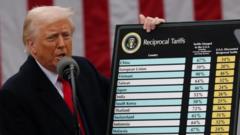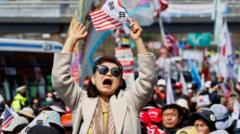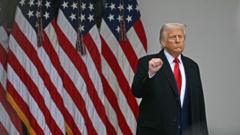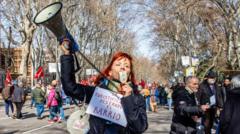Former President Yoon's impeachment reveals a rift within South Korean society, fueled by influences of right-wing media and protest movements.
Yoon Suk Yeol's Impeachment Sparks Deeper Divisions in South Korea

Yoon Suk Yeol's Impeachment Sparks Deeper Divisions in South Korea
After a controversial presidency, Yoon Suk Yeol leaves behind a polarized nation grappling with rising extremism.
South Korea is witnessing a profound political upheaval following the impeachment of former President Yoon Suk Yeol, whose controversial tenure has left the nation more divided than ever. As news of the Constitutional Court's ruling reverberated, supporters gathered outside Yoon's official residence, expressing emotional dismay. "It's so unfair," lamented 64-year-old Won Bog-sil, whose sentiments echo a broader discontent among Yoon's passionate followers. This demonstration, live-streamed on platforms like YouTube, underscores the increasing significance of digital media in shaping political narratives.
Yoon's reliance on martial law and support from right-wing YouTubers has galvanized a fringe movement that, while marginal, has turned increasingly radical. Many supporters portray Yoon as a martyr, believing his actions were essential to combat what they view as threats from the opposition party, which they accuse of harboring pro-North Korean sentiments. These sentiments have not only intensified among his core supporters but have also spilled into public demonstrations, characterized by chants eerily reminiscent of U.S. protest movements, including "Stop the Steal," and violent encounters with law enforcement.
The political climate has become fraught with tension, as incidents of aggression from Yoon's backers, including a courthouse storming and threats against opposition members, capture headlines, raising alarms even within conservative circles. Critiques of these acts have surfaced, suggesting that a generation overly influenced by sensationalist media is fostering a skewed perception of reality, entrenched in conspiratorial thinking.
Despite Yoon's disgrace, his political party—the People Power Party (PPP)—has inexplicably surged in support, capturing approval ratings higher than prior to his martial law declaration. Some believe Yoon's unabashed martyrdom propelled him to an almost mythical status among die-hard followers who feel isolated in their belief that the opposition is jeopardizing national integrity.
The significant disconnect within the PPP is growing, with some members advocating for Yoon while others actively support his impeachment. There is palpable anxiety among conservatives about the growing radicalization within their ranks, compounded by reciprocal challenges from the leftist media. Experts warn that escalating polarization could jeopardize social cohesion and democratic dialogue in South Korea, creating an unyielding political landscape where compromise becomes increasingly unattainable.
As the dust settles from Yoon's tumultuous presidency, many ponder the trajectory of a nation wrestling with its identity amidst deepening divides and rising extremism.
Yoon's reliance on martial law and support from right-wing YouTubers has galvanized a fringe movement that, while marginal, has turned increasingly radical. Many supporters portray Yoon as a martyr, believing his actions were essential to combat what they view as threats from the opposition party, which they accuse of harboring pro-North Korean sentiments. These sentiments have not only intensified among his core supporters but have also spilled into public demonstrations, characterized by chants eerily reminiscent of U.S. protest movements, including "Stop the Steal," and violent encounters with law enforcement.
The political climate has become fraught with tension, as incidents of aggression from Yoon's backers, including a courthouse storming and threats against opposition members, capture headlines, raising alarms even within conservative circles. Critiques of these acts have surfaced, suggesting that a generation overly influenced by sensationalist media is fostering a skewed perception of reality, entrenched in conspiratorial thinking.
Despite Yoon's disgrace, his political party—the People Power Party (PPP)—has inexplicably surged in support, capturing approval ratings higher than prior to his martial law declaration. Some believe Yoon's unabashed martyrdom propelled him to an almost mythical status among die-hard followers who feel isolated in their belief that the opposition is jeopardizing national integrity.
The significant disconnect within the PPP is growing, with some members advocating for Yoon while others actively support his impeachment. There is palpable anxiety among conservatives about the growing radicalization within their ranks, compounded by reciprocal challenges from the leftist media. Experts warn that escalating polarization could jeopardize social cohesion and democratic dialogue in South Korea, creating an unyielding political landscape where compromise becomes increasingly unattainable.
As the dust settles from Yoon's tumultuous presidency, many ponder the trajectory of a nation wrestling with its identity amidst deepening divides and rising extremism.

















